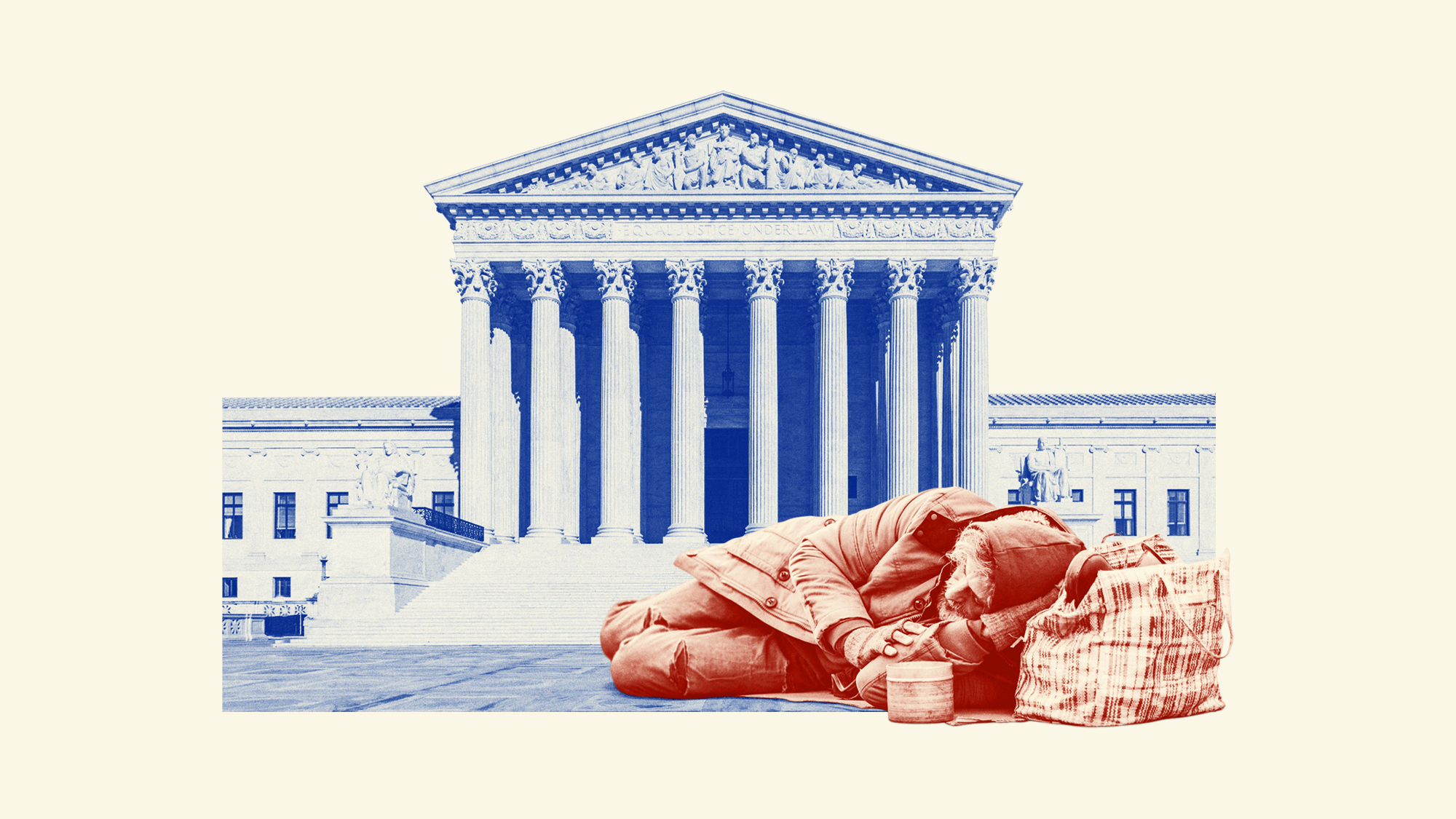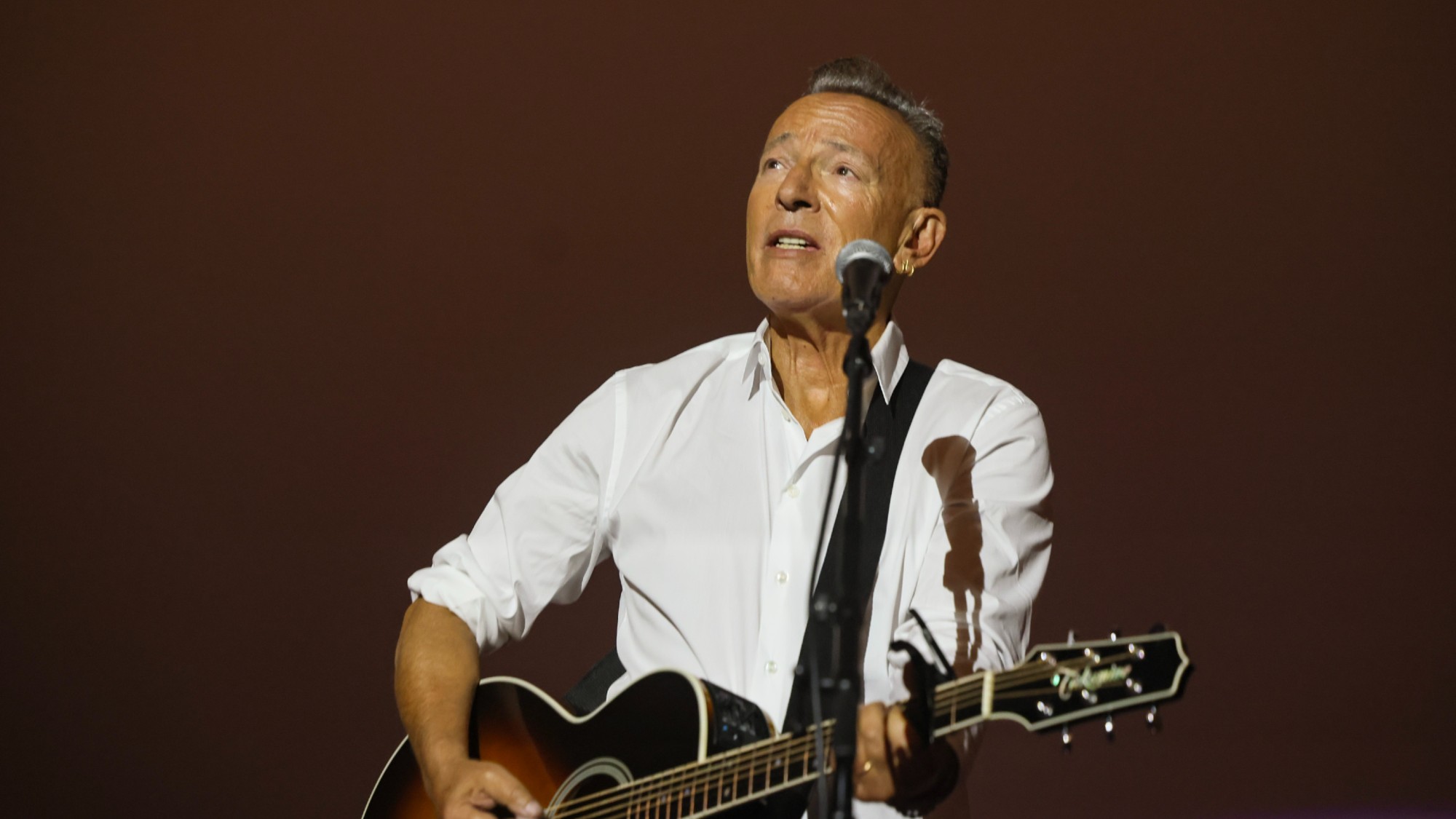Is the Supreme Court about to criminalize homelessness?
The court will decide if bans on outdoor camping are 'cruel and unusual'


A free daily email with the biggest news stories of the day – and the best features from TheWeek.com
You are now subscribed
Your newsletter sign-up was successful
Can homeless people be punished for sleeping outside? The Supreme Court is about to decide. The court will soon hear a case to determine whether towns and municipalities "can fine or jail people for camping in public," The Associated Press said. The case arrives before justices at a critical moment: The federal government reported in December that homelessness has surged to its "highest reported level" — nearly 600,000 people across the country — driven by a lack of affordable housing and the end of pandemic-era housing assistance.
Federal courts have previously ruled that the Constitution's Eighth Amendment, which bars cruel and unusual punishment, "forbids criminalizing sleeping in public" if a person has no other place to lay their head, University of Southern California Law Professor Clare Pastore said at The Conversation. Now the city of Grants Pass, Oregon, is challenging that precedent, arguing the Eighth Amendment "forbids only certain cruel methods of punishment," not fines or jail terms. The Supreme Court's decision, Pastore said, will "affect the health and welfare of thousands of people experiencing homelessness."
Homelessness is becoming more visible in the United States, Stateline said. The result? A growing friction in communities that have pivoted "from a focus on the rights of homeless people to the rights of local residents and businesses" affected by encampments. Justices will decide whose rights matter more.
The Week
Escape your echo chamber. Get the facts behind the news, plus analysis from multiple perspectives.

Sign up for The Week's Free Newsletters
From our morning news briefing to a weekly Good News Newsletter, get the best of The Week delivered directly to your inbox.
From our morning news briefing to a weekly Good News Newsletter, get the best of The Week delivered directly to your inbox.
The Supreme Court can make a difference
Homeless people in Grants Pass are "being punished for the unavoidable human need to sleep," said the ACLU's Scout Katovich. But this isn't just an Oregon issue: "We've seen a troubling uptick" in sleeping and camping bans across the country — even though there aren't nearly enough shelters and beds to give every single homeless person a safe place to rest. "If the Supreme Court rules for Grants Pass, cities could be empowered to treat all of those people as 'criminals.'"
"Obviously homelessness is a distressing, often tragic problem," said Goldwater Institute's Timothy Sandefur. But those problems are driven to a large extent by addiction and mental illness, and "neither of these have ever been viewed as exempting people from the law." In truth, the legal precedent against criminalizing homelessness has only made the problem worse by "confusing and frustrating city officials who want to do something to clean up their communities and help the unsheltered." Instead, forcing cities to allow camping gives them "handy excuses to do nothing about the homelessness problem."
The Supreme Court ruling may have effects beyond the issue of homelessness. A reconsideration of the Eighth Amendment's ban on cruel and unusual punishment "could have ramifications across a wide swath of the criminal justice system," said The Marshall Project. It could limit prisoner rights while making death penalty executions more frequent, depending on how sweeping a ruling the justices decide to issue in the Grants Pass case.
It's bigger than one case
No matter the Supreme Court's ruling, "governments will still be in search of an actual solution" for homelessness, Mandy Chapman Semple and Nathaniel Fields said at Next City. Cities like New Orleans and Houston have come up with successful approaches that move people to housing by "focusing on one encampment at a time." There doesn't have to be a conflict between the needs of homeless people and public safety. "We do not have to choose one over the other."
A free daily email with the biggest news stories of the day – and the best features from TheWeek.com
Whatever the court decides to rule, "criminalizing homelessness won't make it go away," Mark Horvath, Adam Westbrook and Lindsay Crouse said at The New York Times. There are many causes of homelessness, including addiction and mental illness. "Some have made unwise choices, and some are simply unlucky." But a few people simply cannot easily afford shelter: 70% of "extremely low income" Americans pay more than half their income on rent. "Becoming homeless is easier than we'd like to think." The Supreme Court will hear the Grants Pass case on April 22.
Joel Mathis is a writer with 30 years of newspaper and online journalism experience. His work also regularly appears in National Geographic and The Kansas City Star. His awards include best online commentary at the Online News Association and (twice) at the City and Regional Magazine Association.
-
 The environmental cost of GLP-1s
The environmental cost of GLP-1sThe explainer Producing the drugs is a dirty process
-
 Greenland’s capital becomes ground zero for the country’s diplomatic straits
Greenland’s capital becomes ground zero for the country’s diplomatic straitsIN THE SPOTLIGHT A flurry of new consular activity in Nuuk shows how important Greenland has become to Europeans’ anxiety about American imperialism
-
 ‘This is something that happens all too often’
‘This is something that happens all too often’Instant Opinion Opinion, comment and editorials of the day
-
 Big-time money squabbles: the conflict over California’s proposed billionaire tax
Big-time money squabbles: the conflict over California’s proposed billionaire taxTalking Points Californians worth more than $1.1 billion would pay a one-time 5% tax
-
 Supreme Court upholds California gerrymander
Supreme Court upholds California gerrymanderSpeed Read The emergency docket order had no dissents from the court
-
 ‘Something close to a universal rallying cry’
‘Something close to a universal rallying cry’Instant Opinion Opinion, comment and editorials of the day
-
 Did Alex Pretti’s killing open a GOP rift on guns?
Did Alex Pretti’s killing open a GOP rift on guns?Talking Points Second Amendment groups push back on the White House narrative
-
 Washington grapples with ICE’s growing footprint — and future
Washington grapples with ICE’s growing footprint — and futureTALKING POINTS The deadly provocations of federal officers in Minnesota have put ICE back in the national spotlight
-
 Can anyone stop Donald Trump?
Can anyone stop Donald Trump?Today's Big Question US president ‘no longer cares what anybody thinks’ so how to counter his global strongman stance?
-
 Trump’s Greenland ambitions push NATO to the edge
Trump’s Greenland ambitions push NATO to the edgeTalking Points The military alliance is facing its worst-ever crisis
-
 Why is Trump threatening defense firms?
Why is Trump threatening defense firms?Talking Points CEO pay and stock buybacks will be restricted
